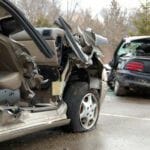Baby, It’s Cold Outside—Stay Safe When Using Portable Heaters
January 3, 2017 / Product Injury
Many of us dislike winter and the way it sometimes feels as if we can’t get warm enough. But how pleasant it can be to relax in front of our portable heaters! A lot of us also enjoy the money-saving aspects that allow us to feel warm and comfy without heating our entire home.
But these pleasures don’t come without some risks attached. Home heating dangers arise largely from space heaters and open flames, such as fireplaces. While the fires, deaths, and injuries due to open-flame heating went down from 2005 to 2014, deaths, injuries, and dollar losses from heating systems rose nationwide:
- 47,600 fires
- 245 deaths
- 850 injuries
- $604,200,000 in losses.
While these figures include all heating system losses, it is estimated that 80 percent of all heating fire deaths in the winter arise from space (portable) heaters. These heaters are also the reason for over 70 percent of all injuries and half of all property damage.
What Kinds of Space Heaters Are There?
Space heaters are usually one of two kinds: electric or combustion. Electric space heaters have no exhaust fumes and do not require venting. Combustion heaters, which require fuel such as kerosene, propane, or natural gas, do generally require venting because they give off carbon monoxide, an odorless, colorless gas which can quickly kill. Symptoms of carbon monoxide poisoning include sleepiness, mental confusion, loss of coordination, vomiting, and passing out.
Many states have banned unvented kerosene heaters when used indoors, and a few states ban unvented natural gas heaters. It is generally recommended that combustible space heaters be vented to prevent carbon monoxide poisoning, even if the law does not require venting.
Risks of Using Fireplaces and Heating Stoves
Without proper venting, carbon monoxide can also present risks if you are burning wood in a fireplace, or wood or coal in a heating stove. But poisonous gas is not your only danger with fireplaces and heating stoves; fires can cause damage if you do not take the proper precautions. For example, creosote and the buildup of flammable carbon deposits can coat chimney flues and cause fires. Also, any sparks that escape the flames can set fires; roofs can blaze up from sparks coming out of the chimney, regardless of whether you are using your fireplace or a wood or coal stove.
What Can I Do to Have a Warm But Safe Indoors?
Some ideas to help prevent injuries and keep your place from going up in flames are:
- Keep children and pets well away from heaters, stoves, and open flames.
- Never place any cover or anything flammable on or over a space heater or stove.
- Never plug an electric space heater into an extension cord! Plug it directly into an outlet that has enough capacity to carry the electrical load.
- Never go to sleep or leave your house with an open flame burning or a space heater running.
- Never run a space heater when you are not in the room.
- Always use the proper fuel for a combustible space heater. NEVER use gasoline!
- Never use any flammable liquid to start a fire in a fireplace, wood, or coal stove.
- Make sure the dampers in your fireplace work properly.
- Keep all space heaters at least three feet away from anything flammable.
- Use only space heaters that automatically shut off when they become too hot or when they are tipped over.
Your local fire department can be an excellent resource should you need more information on venting your heater or using it safely.
Trusted advisors. Proven advocates.
Carbon monoxide gas and raging fires can cause grievous harm, even death. They can also destroy your home and belongings. If, despite your best efforts, you believe that you or a loved one has been harmed by a faulty heating system or defective space heater or heating stove in Indiana, and you would like to explore your options, put Mike Stephenson and his team at Stephenson Rife to work for you. We can study your case and tell you what your rights are. If you or your child has suffered an injury, you deserve compensation. Talk with us about obtaining a free consultation by calling 1-317-825-5200, or by using our online contact form.

 Brady Rife has developed a diverse civil litigation practice for plaintiffs throughout Indiana. Brady is heavily involved in serious personal injury matters, complex business and commercial disputes, and insurance litigation in state and federal courts. Brady has successfully tried several jury trials and bench trials as lead counsel and has also briefed multiple cases before the Indiana Court of Appeals. [
Brady Rife has developed a diverse civil litigation practice for plaintiffs throughout Indiana. Brady is heavily involved in serious personal injury matters, complex business and commercial disputes, and insurance litigation in state and federal courts. Brady has successfully tried several jury trials and bench trials as lead counsel and has also briefed multiple cases before the Indiana Court of Appeals. [ 